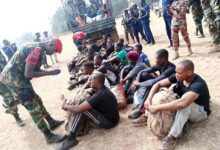Condemnation of child labour in the mining sector National Theatre thrills patrons with ‘Efu Pɔnkɔ’
Africa, the second-largest continent on our planet, possesses a rich array of mineral resources that have the potential to drive economic growth and development for its people. However, the region also struggles with the alarming issue of illegal mining, a clandestine operation that undermines the social, economic, and environmental fabric of African nations.
This illicit activity, driven by greed and disregard for the law, poses a grave threat to the continent’s aspirations for sustainable development. Illegal mining is a pervasive problem across Africa, affecting countries from Sierra Leone, Liberia, Ghana, Zambia, DRC & South Africa to mention a few.
The lure of quick profits and the absence of effective oversight make it an attractive venture for individuals and criminal organisations alike. Gold, diamonds, and other precious minerals are the primary targets due to their high market value, but the extraction methods employed by illegal miners often result in severe environmental degradation and human rights abuses.
In the heart of Africa, beneath its lush landscapes and vibrant cultures, lies a hidden treasure that’s capturing the world’s attention: lithium and other critical minerals. These minerals, essential for the batteries powering our modern lives, are sparking a new kind of gold rush across the continent.
But beneath the glittering promise of prosperity, there’s a dark concern that can’t be ignored—the shadow of child labour, especially in regions like the Democratic Republic of Congo (DRC).
As the demand for these valuable minerals skyrockets, so does the pressure to extract them, often at the expense of ethics and human rights. The DRC, known for its bountiful mineral reserves, unfortunately carries the infamous burden of alarming child labour prevalence in its mining activities.
Sustainability activists are rising to the occasion, determined not only to raise awareness but to push for reforms that will eradicate child labour and ensure the ethical and sustainable extraction of these precious resources.
The mission is crystal clear: challenge the DRC government to act swiftly and decisively, prioritize the rights and well-being of its most vulnerable citizens, and wage a battle for justice that the world is closely watching.
But the fight doesn’t halt at the DRC’s borders. Across the African continent, governments are reevaluating their mining licensing procedures. The old ways, where profit reigned supreme, and communities were often left empty-handed, are giving way to a new ethos. This ethos revolves around equitable wealth distribution from mining, where local communities thrive, and the environment is safeguarded for future generations.
Leading this charge are countries like Ghana, Mali, and Botswana, boldly transitioning from traditional licensing regimes to profit-sharing models. It’s no longer just about extracting minerals; it’s about ensuring the benefits are fairly spread, supporting communities, and preserving the environment.
This transformation isn’t a mere trend; it’s an unstoppable movement. Burkina Faso is now stepping up to join the ranks, embracing the global shift towards responsible mining practices. It’s becoming a beacon of hope in an industry often tainted by controversy.
The undeniable surge in demand for lithium in Africa carries a heavy responsibility. Activists are the catalysts of change, fiercely combating child labour and unethical mining practices. African governments are reimagining the industry with profit-sharing models and strategic licensing regimes.
In navigating this exhilarating yet challenging landscape, one truth prevails: Africa’s wealth isn’t solely in its minerals; it’s in its people, its communities, and its unwavering commitment to a brighter, more equitable future. Beyond the lithium, this is a story of change’s mighty force and the promise of a better Africa for all.
[The writer is the Country Director, Africa Institute of Children working at a Small Scale Mining]
BY: ABDUL-SALAM YUSSIF




